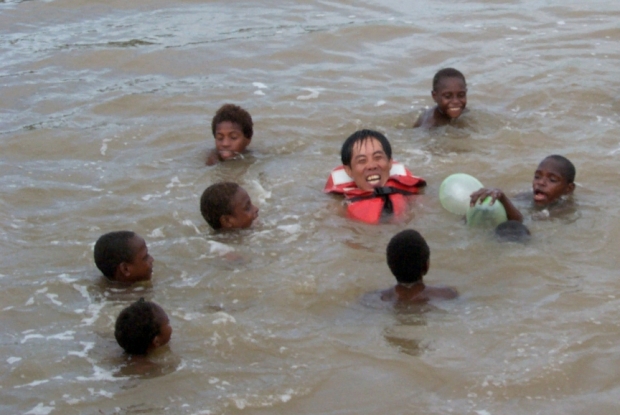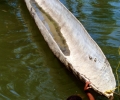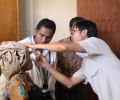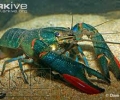The World without Sound
“Percis, percis, an . . ., bii,” were the only words I could grasp from what he said. As he waved his flashlight while talking to me, I understood what Dasih wanted. Percis was light bulb—since it is a technological term and not Indonesian word, it could be a Dutch word—and bii means ‘no’. The last Asmat warrior wanted a new bulb for his torch.
The Asmat was the most famous head hunters in West New Guinea. In late 1961, the ones from Casuarinen Coast were in the global news because they were suspected to kill Michael Rockefeller (23), the son of Governor Nelson Rockefeller of New York and Vice President of the USA later. According to Willem Visser, the first Dutch doctor who visited Casuarinen Coast in 1957, Dasih was one of the warriors.
I asked Dasih and his son to come into my house and checked his flashlight. It did not work. I fetched a bulb from my stock—it was crucial to have reserve bulbs in the interior—and replace his bulb with it. It still did not work. After checking everything on the flashlight, I told him, translated by his son, that he needed a new flashlight.
Dasih wanted to pay me for the flashlight, but I refused to accept the money—he was much poorer than me in term of money. On the other hand, I did not want to give it free because I had seen how destructive the “Sinterklass’ (Saint Claus) method used by the Mission to the Papuans. We made a deal: Dasih would bring me fish for a week for the flashlight.
Every afternoon, sometimes morning, Dasih or his wife came to my house with fish. I asked them to take it to the convent—I did not cook. A week passed, but they kept bringing me fish although I had told them that the deal had been over. Thus, we made another deal: a fishnet for a month fish. Fishnet was expensive and only available in Merauke, five-hour boat to Ewer and 1.5-hour flight to Merauke.
Dasih must have been at least 60 because Doctor Willem Visser met him as adult in 1957. According to Visser, Dasih was one of the best head hunters then. Visser revisited Bayun in 1991 and showed some slides he had taken in 1957 to the villagers. All of the adults in the slides had died except Dasih and two other old men. The People roared on recognizing them.
Dasih’s family was distinguished from the other ones in Bayun. In addition to being famed as the kingdom of mosquitoes, Bayun was also (de)famed as the village of thieves. But Dasih was not one of them. He had four children and one wife, the second one—the first died a few years before—all looked healthy. Dasih was probably the only Asmat man who helped his wife to gather food.
During the construction of the Mission complex in early 1970s, Pater distributed coconut seeds to the people of Bayun and some other villages in Casuarinen Coast. Some families planted them, but most of them just put the seeds under their stilt houses. Not all the planted seeds grew well because some of the planters were too lazy to attend to the seeds: besieged by shrubs. Finally, only Dasih family still cared of the coconut trees. The rest had given up tending their coconut trees because the thieves stole their coconuts even they were still young.
Another month of everyday fish meal. Every day Dasih’s wife brought fish to my house or the hospital—where I was—showed me, and took them to the convent. If I travelled, they stopped the delivery. Again, after a month, they kept bringing me fish. I had nothing useful for them anymore. What should I give them in return?
Mono was the youngest son of Dasih. I did not know his real name. Mono is name for a deaf-mute person—I was wondering if there is a person called stereo. I decided to help Dasih with taking care of Mono.
Although he was deaf-mute, I noticed, Mono was smarter than all his peers. I often ‘hired’ them to clean up my house and hospital yards, and my garden from the overgrowing grasses. Mono was always the quickest to understand my instruction, though he did not hear what I had said. I believed that the frequent sickness when they were very young and the poor nutrition were the causes of the low intellectual capacity of the Asmat children—it might take them five minutes to calculate 5+7, but less time, amazingly, for 100 rupiah plus 200 rupiah. Mono had been nourished well by his parents.
While rowing dugout in standing position on the rough sea was a piece of cake for the Asmat, learning to drive a speedboat was quite an effort. The boat engine gear was simple, forward and backward, but the steps to make the boat running was very complicated to the Asmat: lower the tail into the water; switch gear to neutral position; open the petrol tap; pull the starter string; switch gear to forward position; increase the gas handle while directing the boat; open the kerosene tap; and closed the petrol tap. I needed six months to make my motorist master this sequence.
If we hired someone for a routine task such as cleaning house or keeping the grass on the lawn short, every morning we had to give the same instruction. The instruction was expired after one day. Impressively, Mono did not have problem with these routine tasks. Mono knew when he had to stop and when to restart executing my ‘algorithm’. His brain was Windows while the others were DOS.
In normal world, children are able to take shower and eat by themselves around five years old. Mono was about 9—guessing from the size of his ‘bird’—but I had to teach him by doing these basic activities to him. The Asmat did not take shower; if they did, probably because of mud covering whole body, no soap was used. After cleaning their bodies in either the river or sea, they would wear the same clothes—dirty and wet—because most of the time that was the only clothes they had. Thus, it would be a wonder to see an Asmat child without mud and runny nose.
Mono learned hygiene and sanitation fast. He changed clothes on alternate days. He looked funny with the over-sized T-shirts and shorts of mine. I also gave him a big colorful towel—the sunbathing towel—which he put on his shoulder wherever he went; he enjoyed the admiring gaze of his friends for the towel. However, this showing off cost him washing the towel at least three times per week. He did not seem mind with this extra activity.
The Asmat used metal plates or leaves and fingers for eating. I preferred, initially, that Mono kept using his fingers for eating because he would return to his folks after I left. But watching him struggle with fingers on noodle was tiring. I taught him using fork in the end.
The thing that Mono loved most was travelling me with my boat. And, I was happy too to have a reliable travel mate. He was more skillful than my motorist within a few months; I had no doubt he was smarter than him. The only problem was when I needed him while he was not looking at me. I had to approach and touch him, or, to throw something at him. Because there was no single rock in Asmat, the latter method was not always possible.
If we did not travel, Mono’s job was taking care of my garden and coconut trees of the Mission’s. A couple times, he informed me about the theft. The Silent code of the Asmat was not applied to him; he had been silent since he had been born.
Every morning Mono collected the fallen coconuts of the night before. We sold them to Agats by the mapi, the slow boat of Pater Ton’s. I paid some children to help him with his tasks, especially the cleaning up the bush under coconut trees. In the beginning, Mono worked together with them, but after a while, he only moved around with his finger pointing. He promoted himself the boss! I cancelled the promotion by pulling his ear when he was bossing.
Mono liked flipping over Tempo magazines; he continuously babbled ‘ah uh ah uh’. He often brought the magazines to me, pointing to the pictures. I just scratched my head. How could I explain modern things to a deaf-mute boy that had never left the jungle? The only modern stuff he had seen were single-engine aircraft, speedboat, communication radio, and transistor radio. He had never seen a bicycle or even a cart, the thing that the people in China, India, Egypt, Greece, and Mesopotamia had used 3,000 years ago.
Dasih was very happy with my adoption of Mono. We did not talk with language but gesture. If we ran into in the paths, we ‘boxed’. Laughter, smile, facial expression, and body movement are universal language. Unfortunately, Dasih passed away when I was in Merauke. Sister Victoria did not know the cause of his death. The last warrior of Bayun was gone. I felt sorry that I had not been by his side in his last minutes.
Living with Mono made me ponder on the world and human beings. How he perceived the world? My evenings for years in the interior, alone, had been quiet, but I was still able to the constant voices of night birds, insects, frogs, and bats. Still I felt lonely and often sad.
Mono heard nothing, and said nothing except ‘ah uh’. We imagine the world were a terrible place to live for a deaf-mute like him. On the contrary, Mono always looked happy. His eyes were always sparkling. Perception of our ‘now’ world does not seem affect our feeling negatively if we know no other world, the ‘supposed’ world. The less we think about our life is supposed to be, the happier our present life is.





